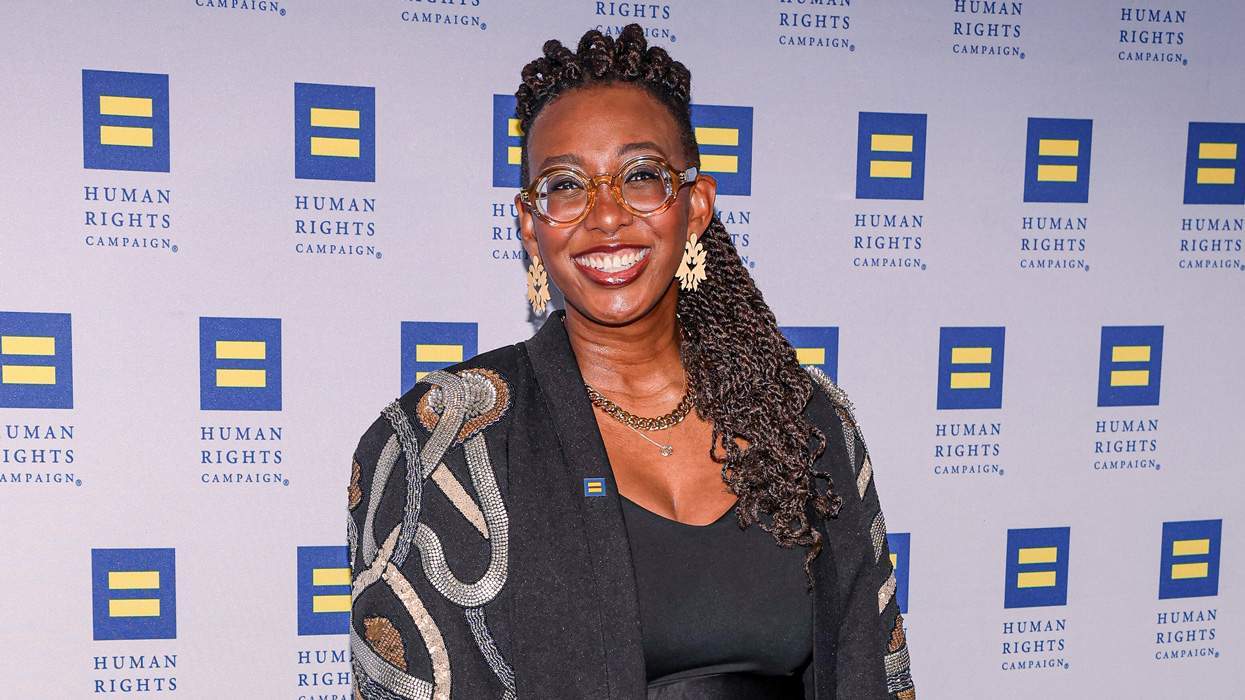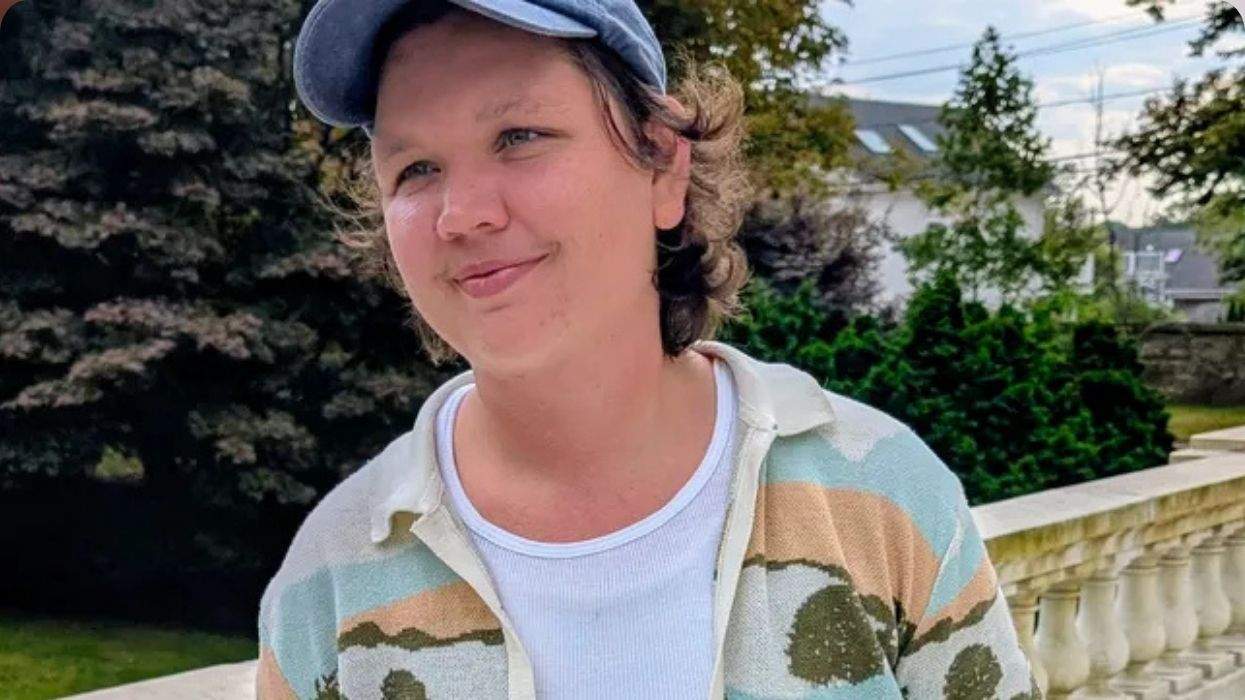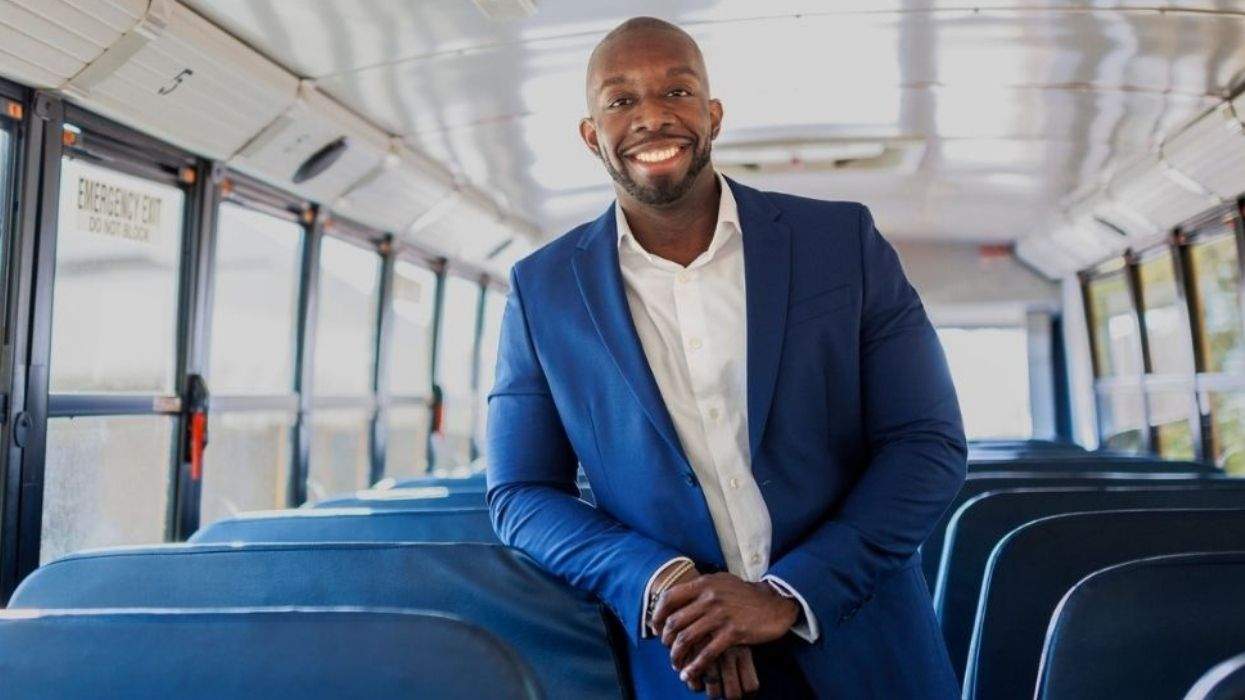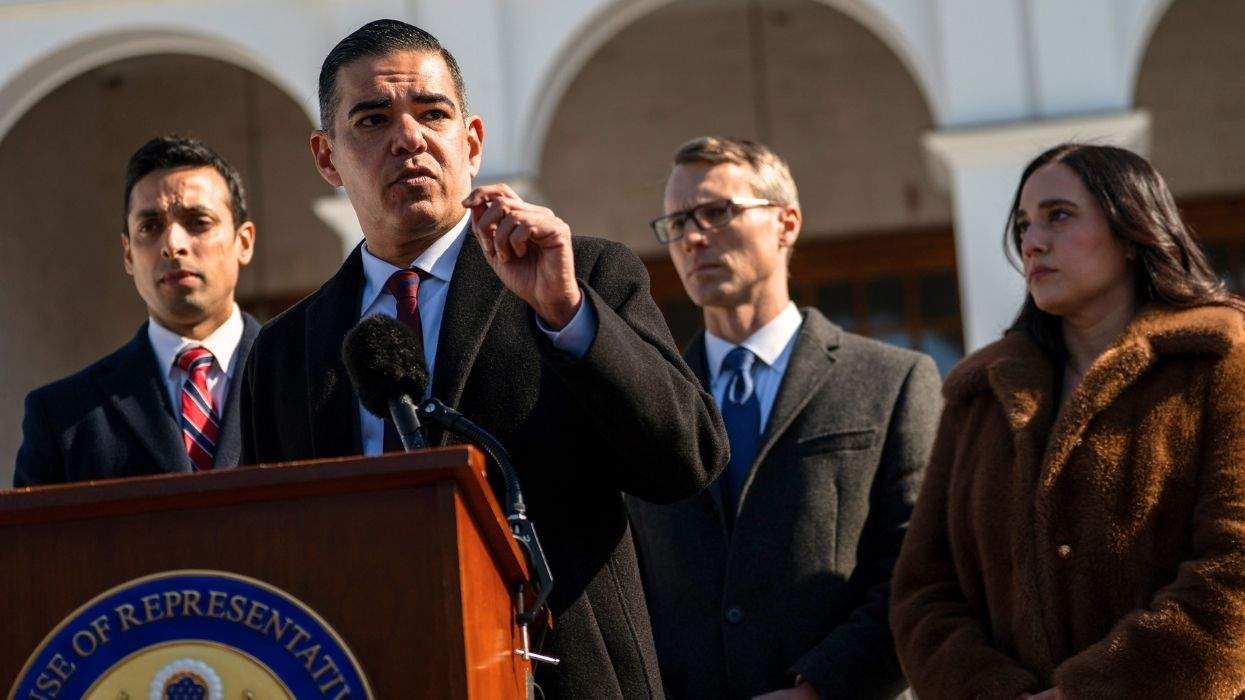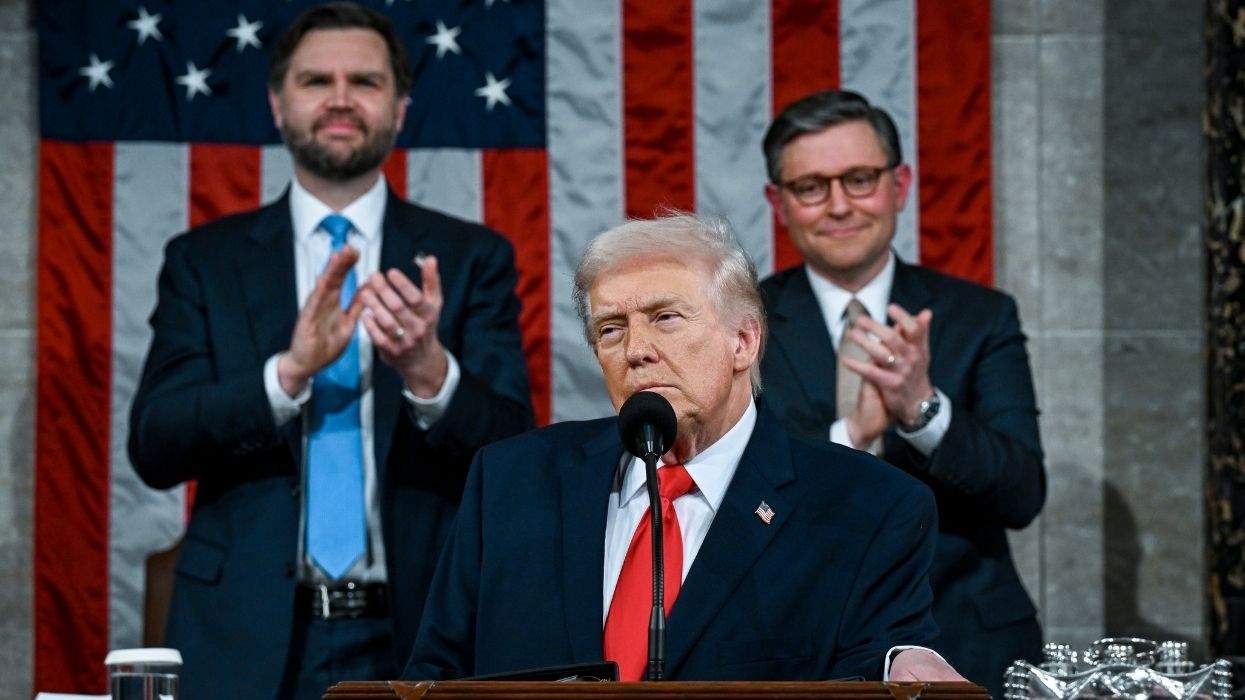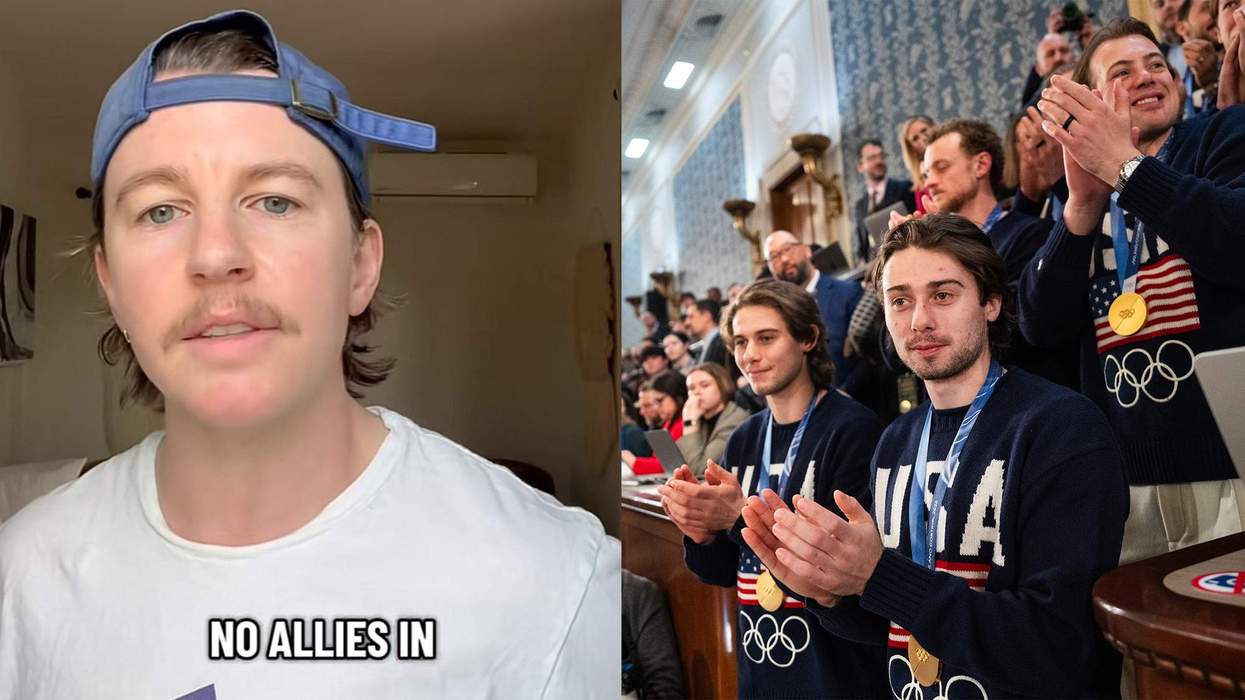Barack Obama's troops have been making a push in the LGBT communities of both Ohio and Texas to cut into Hillary Clinton's long-standing support among gays and lesbians before Tuesday's critical primary vote.
"Our goal was to really deputize the members of our steering committee to organize our community in the major metropolitan areas of those states," said Eric Stern, an Edwards-turned-Obama supporter who has been overseeing LGBT field organizing in Ohio and Texas for the Obama campaign. Polls show the two candidates in a statistical dead heat in Texas, while Clinton has anywhere from 5- to 10-point edge in Ohio.
Comparing their strategy to the Bush/Cheney get-out-the-vote efforts in Ohio in 2004, Stern said the Obama camp has identified local LGBT folks to work gayborhoods such as Montrose in Houston and the Short North in Columbus.
"What they did, that we're now doing, was they deputized local people to go door-to-door and serve as precinct captains, while the Kerry campaign was sending people from out of state into Ohio to run the ground game," he said, adding that he believes that's why the Democrats lost the Buckeye State in 2004. "Ultimately, if you're talking to an undecided voter, if you're their neighbor down the street, they're more likely to listen to your argument and be persuaded by it. We've learned from that."
But just as quickly as Obama has been striking, Clinton has been swinging back. No sooner had his campaign secured four full-page ads in four separate gay weeklies in Dallas, Houston, Columbus, and Cleveland, than she had conducted a conference call with reporters from three of the same weeklies. The Clinton camp also announced the formation of a 38-member LGBT steering committee in Ohio last week.
And in Houston - which has the 10th largest gay population in the nation - after the city's nonpartisan GLBT caucus endorsed Obama last week, Clinton spent 20 minutes of her Friday evening answering questions from the Houston Stonewall Democrats, who endorsed her on Saturday.
"It's an exciting time down here in Texas, the most exciting in my lifetime," said 45-year-old Teresa Herrin, president of Houston's Stonewall chapter, her voice cracking from the strain of too much politicking. Herrin said they extended an offer to both candidates to speak with their five-member executive board but that the Obama campaign finally declined the offer at 10:00 a.m. Saturday morning.
"One of our members is a strong Obama supporter, so it was really disappointing," Herrin said.
In terms of the Clinton call, Herrin added, "What really surprised us was her passion - that she understood the immediate need for our community."
Within the first 100 days of her presidency, Herrin said, Clinton promised to extend benefits to all same-sex couples who work for the federal government with an executive order, end "don't ask, don't tell," and use the bully pulpit to advocate for a fully inclusive ENDA and a fully inclusive hate-crimes bill. (Herrin and her executive board were not clear how Sen. Clinton would end "don't ask, don't tell" - if by executive order or some other means.)
Clinton also discussed how adamant she is about allowing everyone in America to adopt children if they are a qualified couple. "It was like she was indignant," Herrin said of Clinton's manner while talking about same-sex couples' adoption rights. "Her voice just really changed, and that was the part that surprised us - her passion."
On the Obama side, Randall Ellis, chairman of the senator's Texas LGBT steering committee, is equally as enthused. "As Texans, we're used to being told, 'This is your nominee, this is who you need to support,'" said Ellis, who was quietly backing John Edwards until he dropped out of the race. "People here aren't used to being asked the question, 'Who are you supporting in the primaries?' We really don't know what hit us - all the sudden we're a campaign stop."
When the Obama campaign came knocking, Ellis, 38, was already engaged in reelection campaigns for two of the LGBT community's "biggest allies" in the Texas state legislature, Reps. Garnet Coleman and Jessica Farrar. "They're often vulnerable because they take stances on LGBT issues, and so people challenge them in primaries," Ellis explained.
Ellis weighed his options for a couple weeks and ultimately decided to go with Obama, partly because of his stance for full repeal of the Defense of Marriage Act (Clinton supports partial repeal), but there was something more.
"It's that certain je ne sais quoi," Ellis said. "The people that you look at as a leader need to give you that sense of inspiration and hope, and that certainly is evident in the Obama campaign. People play that off like it doesn't mean anything. But I think it means a lot."
Ellis organized people this weekend to canvass in the Montrose neighborhood of Houston. According to estimates by demographer Gary Gates at the Williams Institute, that zip code, 77006, has a GLB population density of about eight times the national average - almost exactly the same density as New York's Chelsea district, while San Francisco's Castro holds about 20 times the national average.
After meeting up Saturday at the Starbucks on Montrose Blvd., the uniformed Obama volunteers dispersed to cafes, bars, and street corners, initiating one-on-one discussions and asking passers-by: Are you voting for Obama? Are you going to caucus? Have you told your friends?
Rebekah Lee, a volunteer from Bellingham, Wash., employed technology to give on-the-fence-voters a reason to consider Obama - using her cell phone, she pulled up a copy of Obama's recent open letter to the GLBT community posted on Bilerico.com. "I really believe in Barack for our time," said Lee. "He's not afraid to answer a question with an 'I don't know' or give you the tough answer. I can tell Barack wants the office to be able to serve people."
And just as Montrose was on fire with activity, so was the Short North in Columbus, where a gallery hop that attracts thousands of people ensues the first Saturday of every month. According to locals, Columbus has the second-largest Pride celebration in the Midwest behind Chicago.
Mary Jo Hudson, a Clinton supporter and the highest-ranking LGBT official in the state as a member of the governor's cabinet, headed over to the gallery hop with a crew of folks armed with buttons and stickers. "That's something we do in Columbus whenever we're doing outreach in campaigns," she said.
Hudson, 46, also had about 70 people over to her house on Saturday night for a rally with three Clinton surrogates: Randi Weingarten, president of the United Federation of Teachers; California state representative Laura Richardson; and Brenda Berkman, the first female firefighter in New York City.
Hudson, a long-time Clinton ally who served on the Human Rights Campaign's Board in the '90s, said she reminds people that "from day one, the office of the first lady was very inclusive and how she was an outspoken advocate on inclusion and equality and stood up for the LGBT community against the far right."
The Obama camp also had a presence at the gallery hop and, for the most part, Hudson said the back and forth between the campaigns in Ohio has been collegial. "That's how we do things here in Columbus," she said. "But when we move to the general election - when that finally happens - it will be important for national leadership to make sure we're all pulling together, because I've never seen anything quite like this, with the two sets of strong feelings out there."
It's what Cleveland-based Jason Lansdale felt as he was assembling people to sign on to an op-ed in support of Obama to be run in Ohio's LGBT newspapers. "Just the energy and the passion," he said. "Obviously we wanted as many signatures as possible. We went from five or six key leaders in Ohio to almost 60 overnight. I was really surprised." Altogether, 53 LGBT leaders signed on to the letter, which is currently running in this week's issue of Outlook Weekly in Columbus.
Lansdale, 31, typifies the on-the-ground warrior that Eric Stern was looking to enlist in the Obama campaign. He's lived in every corner of the state, is a former president of the Stonewall Democrats chapter of Central Ohio in Columbus, cochaired the LGBT campaign in Ohio for Kerry/Edwards in '04, and was the LGBT coordinator for Jennifer Brunner, Ohio's current secretary of state.
Lansdale explains that Ohio has five distinct regions. "The [Cleveland] Plain Dealer did a piece leading up to the 2004 elections called 'The Five Ohios' - those being the Northwest, Northeast, Southwest, Southeast, and Central Ohio - about how really different they are culturally and politically."
For instance, the Southwest is pretty strongly Republican with lots of evangelicals and an Air Force base in Dayton; central Ohio used to tilt toward the GOP but in the last couple presidential cycles, Columbus and Franklin counties have gone Democratic (housing Ohio State University with 50,000 students doesn't hurt); and the Northeast with cities like Cleveland and Akron has been a bastion of the Democratic base. It's a glimpse of the challenge both campaigns faced in reaching vastly different voters across both Ohio and Texas. Obama has reportedly outspent Clinton on advertising at least two-to-one in both states.
One of the big-selling points on Obama for Lansdale was hearing him reference the LGBT community and homophobia in a number of his speeches. "Obama includes the LGBT community in his core message -- he's not afraid to say the words gay and lesbian," he says. "I'm not questioning Hillary's support - she has a wonderful track record of support on our issues, but you don't see her use the word gay very often."
Lansdale represented Obama as a surrogate during one of three LGBT forums organized by the National Stonewall Democrats in Cleveland, Dallas, and Houston last week. All three events drew around 100 people or more, according to Stonewall's executive director, Jon Hoadley.
"Not bad on a Monday or Tuesday," Hoadley said of the attendance. "People were there and excited about being Democrats - that's such a sea change from what we've been seeing in the past."
Hoadley attended both the Houston and Dallas forums and said one of the most interesting things at the events was the line of questioning.
"We had the top LGBT policy advisers from both the Clinton and Obama campaigns, and what was the first question out the gate? Health care," recounted Hoadley, adding that the discussions around immigration and the alternative minimum tax were as robust as those around "don't ask, don't tell" and civil unions. "People were looking for real policy answers on a whole host of subjects. We even got to stump them sometimes."
Jesse Garcia, president of the Dallas Stonewall Democrats chapter, also attended the Dallas forum. "I love that our community was able to think outside our own self interests - we're just like any other American, we're worried about the future of America and our standing in the world."
And that's a message that Garcia, who is a fervent Clinton supporter, has been advancing with his members as well. "I keep reminding everyone, regardless of their presidential choice, this a great opportunity to be introducing yourself and saying 'Hey, I'm a gay Democrat and let's see how we can work together to fix this nation,'" said Garcia. "I think it's important that we start sensitizing other Democrats - because there's good Democrats and there's so-so Democrats on our issues."
The Dallas Stonewall chapter, which endorsed Sen. Clinton, is the largest dues-paying Democratic club in Dallas, with about 350 members. Garcia, 36, who joined the club in 2000 when it stood at around 80 members, said the club's size is a direct result of the fact that the LGBT community suffers continuous attacks in Texas.
"We have congressmen who introduce antigay legislation, so we're always on the defensive and ready to mobilize," he said.
Garcia is also sort of a "double threat," as he puts it, as both a gay and a Hispanic rights activist. He's been working to build a bridge between the two communities and helped found the first predominately gay chapter of the League of United Latin American Citizens (or LULAC), which he calls "the Hispanic version of the NAACP."
"The same people that came after us on banning same-sex marriage turned around and reformed and are now going after immigrants," said Garcia. "It's all about learning from each other's communities and sharing common interests."

